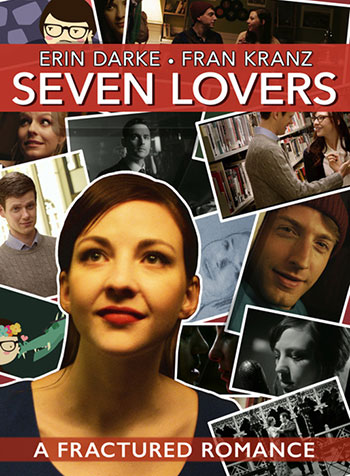Film Review: Seven Lovers, by Keith Boynton ’05E

It’s an ambitious project for writer-director Keith Boynton ’05E, who fully commits to making the seven stories radically different from one another. He mostly pulls it off.
All of the tales are engaging, even as two particular lovers come to dominate the narrative. The movie opens with an unseen man interviewing Laura from behind the camera, in the intimate, confessional style of James Spader’s character in the film Sex, Lies, and Videotape.
That man (whose name we later learn is Karl) becomes an increasingly dark presence in Laura’s life as their story—depicted entirely in found-footage-style clips—progresses, and it stands in stark contrast to another story, depicted in static, unbroken widescreen takes, in which Laura meets an awkward dork named Brian (Fran Kranz) via an online dating site.
How does Laura get from Karl to Brian, and where do her five other lovers fit in? Those answers become clearer as the movie progresses, and the stories—which alternate throughout the 108 minutes—start working together more smoothly.
Boynton depicts a one-night stand as a series of impressionistic images with no dialogue or music. The bitter end of another relationship is presented as a voiceover dialogue between Laura and her lover as they look at a series of drawings he’s made. There’s a fairy-tale-style animation in which Laura initially rejects her knight in favor of a fire-breathing dragon, and a 1940s-style piece, filmed in black and white and complete with musical numbers, in which Laura is a glamorous lounge singer.
It is, in short, a lot, as if Boynton
threw in every cinematic idea he’s ever had, in case he might not get to make another movie. Yes, Laura is slightly different in each story, but Darke’s impressive performance and Boynton’s assured direction—he demonstrates mastery of some wildly divergent styles—hold the pieces together more effectively than the jarring transitions into each story would indicate. Boynton is ultimately best at the more straightforward, dialogue-driven segments, including the most conventional, a rom-com that finds Laura awkwardly searching for a handsome Brit with whom she’s had a brief encounter.
For all its formal experimentation, the movie comes to a fairly mundane and uncomplicated end. Still, the journey is exciting and unpredictable, and it marks Boynton as a filmmaker with plenty of talent to apply to future projects, in whatever genre he settles on.
Josh Bell '02 is the Las Vegas Weekly film editor.
